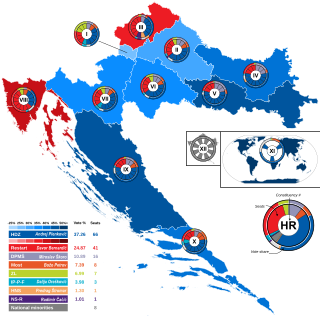
Osijek is the fourth-largest city in Croatia, with a population of 96,848 in 2021. It is the largest city and the economic and cultural centre of the eastern Croatian region of Slavonia, as well as the administrative centre of Osijek-Baranja County. Osijek is on the right bank of the Drava River, 25 km (16 mi) upstream of its confluence with the Danube, at an elevation of 94 m (308 ft).

Parliamentary elections were held in Croatia on 23 November 2003 to elect all 151 members of parliament. They were the fifth parliamentary elections to take place since the first multi-party elections in 1990. Voter turnout was 61.7%. The result was a victory for the opposition Croatian Democratic Union (HDZ) which won a plurality of 66 seats, but fell short of the 76 needed to form a government. HDZ chairman Ivo Sanader was named the eighth Prime Minister of Croatia on 23 December 2003, after parliament passed a confidence motion in his government cabinet, with 88 MPs voting in favor, 29 against and 14 abstaining. The ruling coalition going into the elections, consisting of the Social Democratic Party (SDP), Croatian People's Party (HNS), Croatian Peasant Party (HSS), Party of Liberal Democrats (Libra) and the Liberal Party (LS), did not contest the elections as a single bloc; the SDP ran with the Istrian Democratic Assembly (IDS), the Party of Liberal Democrats (Libra) and the Liberal Party, HNS ran with the Alliance of Primorje-Gorski Kotar (PGS) and the Slavonia-Baranja Croatian Party (SBHS), while HSS ran on its own.

The Croatian Parliament or the Sabor is the unicameral legislature of Croatia. Under the terms of the Croatian Constitution, the Sabor represents the people and is vested with legislative power. The Sabor is composed of 151 members elected to a four-year term on the basis of direct, universal and equal suffrage by secret ballot. Seats are allocated according to the Croatian Parliament electoral districts: 140 members of the parliament are elected in multi-seat constituencies. An additional three seats are reserved for the diaspora and Croats in Bosnia and Herzegovina, while national minorities have eight places reserved in parliament. The Sabor is presided over by a Speaker, who is assisted by at least one deputy speaker.

Osijek-Baranja County is a county in Croatia, located in northeastern Slavonia and Baranja which is defined part of the Pannonian Plain. Its center is Osijek. Other towns include Đakovo, Našice, Valpovo, Belišće, and Beli Manastir.
This article gives an overview of liberalism in Croatia. Liberals became active since 1860 in Dalmatia and since 1904 in the rest of Croatia. It never became a major political party. It is limited to liberal parties with substantial support, mainly proved by having had a representation in parliament. The sign ⇒ denotes another party in that scheme. For inclusion in this scheme it isn't necessary so that parties labeled themselves as a liberal party.
Slavonia-Baranja Croatian Party was a regional political party in Croatia.
Zlatko Kramarić is a Croatian liberal politician from Osijek.
Branimir Glavaš is a Croatian retired major general and politician. He was one of the founders of the Croatian Democratic Union (HDZ) party which was in power in the 1990s and one of its key figures until a split in 2006.

The Serbian Autonomous Oblast of Eastern Slavonia, Baranja and Western Syrmia was a self-proclaimed Serbian Autonomous Oblast (SAO) in eastern Croatia, established during the Yugoslav Wars. It was one of three SAOs proclaimed on the territory of Croatia. The oblast included parts of the geographical regions of Slavonia, Baranja, and Syrmia along the Croatian section of the Danube river Podunavlje region.

Parliamentary elections were held in Croatia on 25 November 2007 and for overseas voters on 24 and 25 November. The campaign officially started on 3 November. The President of Croatia announced elections on 17 October and 14 days were allowed for candidate lists to be submitted.

In Croatia, the Opposition comprises all political parties represented in the Croatian Parliament that are not part of the Government which is supported by the parliamentary majority.

Parliamentary elections were held in Croatia on 8 November 2015. All 151 seats in the Parliament were up for election. This parliamentary election was the 8th since the first multi-party election in 1990 and the first since Croatia joined the European Union in 2013. The ruling center-left Croatia is Growing coalition, led by Prime Minister Zoran Milanović, was challenged by the center-right Patriotic Coalition led by the HDZ and headed by its party chairman Tomislav Karamarko, and also faced several new political coalitions.
Vladimir Šišljagić, born in 1957 in Osijek is Croatian cardiac surgeon and politician. Šišljagić is the leader of Croatian Democratic Alliance of Slavonia and Baranja, a regionalist and right wing populist political party in Croatia.
Alliance for Croatia was a right-wing electoral alliance in Croatia. The aim of the coalition was the joint appearance of smaller right-wing parties in the 2014 European Parliament elections and 2014–2015 Croatian presidential elections. The coalition was dissolved in 2015.

Parliamentary elections were held in Croatia on 5 July 2020. They were the tenth parliamentary elections since the first multi-party elections in 1990 and elected the 151 members of the Croatian Parliament. 140 Members of Parliament were elected from geographical electoral districts in Croatia, three MPs were chosen by the Croatian diaspora and eight MPs came from the ranks of citizens registered as belonging to any of the 22 constitutionally recognized national minorities.

The Tenja concentration camp was one of 26 concentration camps established in the Independent State of Croatia during World War II. It was located close to village of Tenja near Osijek and operated by Ustaše.

The Democratic Alliance of Serbs is a social democratic political party of Serbs in Croatia.











